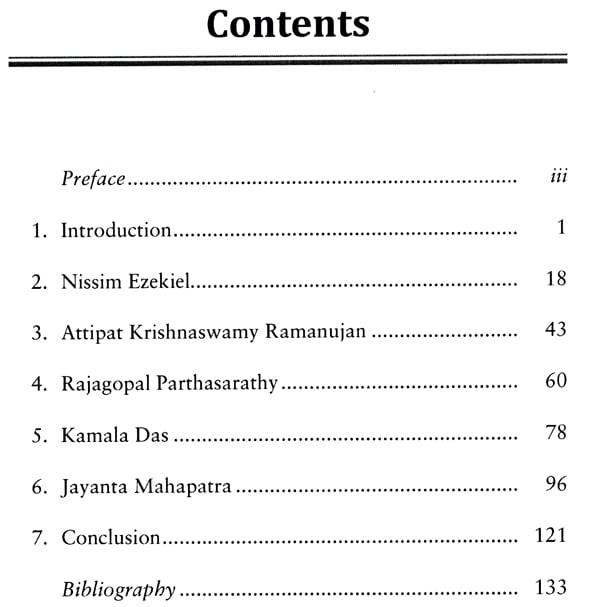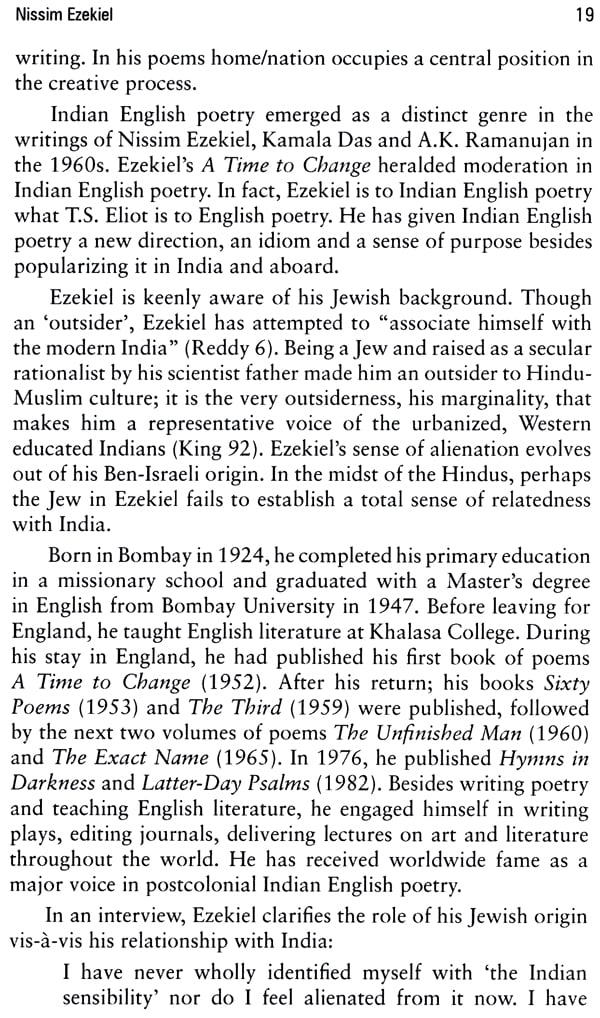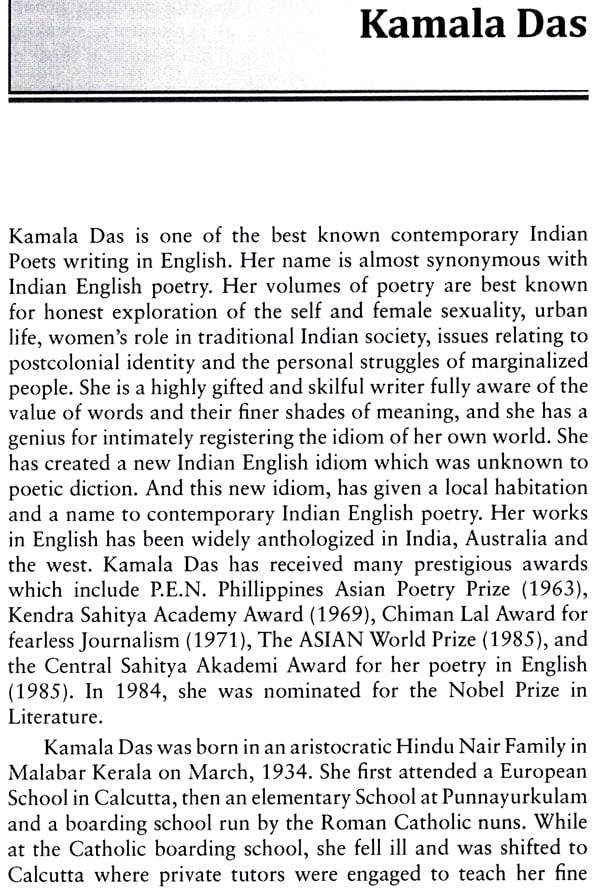
Indian Poetry in English (A Critical Study)
Book Specification
| Item Code: | NAS277 |
| Author: | Sangita Padhi |
| Publisher: | Atlantic Publishers and Distributors Pvt. Ltd. |
| Language: | English |
| Edition: | 2018 |
| ISBN: | 9788126920969 |
| Pages: | 164 |
| Cover: | HARDCOVER |
| Other Details | 8.50 X 5.50 inch |
| Weight | 330 gm |
Book Description
Indian English poetry is the oldest form of Indian English Literature. Henry Louis Vivian Derozio is considered the first poet in the lineage of Indian English poetry followed by Sri Aurobindo, Sarojini Naidu, and Toru Dutt, among others. Indian poetry in English established itself globally as a distinctive genre with the pioneering works by Nissim Ezekiel, A.K. Ramanujan, R. Parthasarathy, Kamala Das and Jayanta Mahapatra. Another significant poet of the post-Derozio and pre-Ezekiel times is Rabindranath Tagore but he wrote primarily in Bengali and was responsible for the translations of his own work into English.
The book critically examines the poetry of Nissim Ezekiel, A.K. Ramanujan, R. Parthasarathy, Kamala Das and Jayanta Mahapatra, who are the major voices in the contemporary Indian poetry in English. It attempts to analyse different modes and strategies employed by these poets to substantiate the view that their poetry makes a persistent effort to construct the concept of home and/or nation and the urge behind such construction. Each of these poets follows the quest for the metaphoric and symbolic dimensions of home/nation, which is central to his/her poetry.
The book also provides a historical perspective of Indian poetry in English from Derozio to the present time. It highlights how the English romanticism of the early Indian English poets makes a significant departure in the writings of poets of the post-Independence and post-colonial period. Strategies and paradigms employed by the latter have been discussed. A brief study of a few other poets who share the same vision has also been included.
The book is rich with references from the poems of the celebrated poets taken up for study. Comments of well-known critics have been given at appropriate places. The secondary source materials have been incorporated from a post-modern and post-colonial perspective. There is Bibliography at the end for further reading.
The book will be useful for the students and teachers of Indian English Literature, especially Indian English poetry, and researchers in these fields.
Dr. Sangita Padhi, M.A. English, holds Ph.D. and M.Phil. degrees in English Literature. Her area of research is Indian Poetry and American Literature. She has thirty-three years of teaching experience at various levels. Presently, she is working as a Reader in BJB (Autonomous) College, Bhubaneswar, Odisha.
The book aims at studying the form and vision in the poetry of Nissim Ezekiel, A.K. Ramanujan, R. Parthasarathy, Jayanta Mahapatra and Kamala Das. It proposes to examine and analyze the various modes and strategies employed by these Indian poets writing in English to construct the concept of home and/or nation in their poetry. The book also discusses the compulsions behind their quest for such construction.
Home assumes a metaphoric and symbolic significance in the poetry of Ezekiel, A.K. Ramanujan, R. Parthasarathy, Jayanta Mahapatra and Kamala Das. All of them share a common home-bound vision as they realize that home and the land of their birth embody human warmth, security, love and affection. In relating themselves to their homes and the nation, these poets find their own identities and reaffirm their faith in human values, family and familial relationship. They come to realize that home is an abode and symbol of security, love, grace and solace. Hence, in their poetry, these poets show an intense earnestness for construction of home and the nation, and all of them share a common vision i.e. the home-bound vision.
The book also examines the form of their poetry by a close reading of the poems, and tries to establish that each of the five poets under study shows his/her deep commitment to the values and traditions of the land he/she is born into, its culture, history and milieu. Most importantly, all of them have skilfully integrated the linguistic and rhetorical resources of both the English language and their mother tongue. Although they use English as their creative medium, they remain bound to their home, society, culture and nation, which authenticate their identity and shape their sensibility.
Indian poetry in English in the post-Independence period has formed a distinctive indigenous tradition of its own. But it would not be possible to examine all the poets who have formed and/or perpetuated such a tradition. For the sake of convenience, the study brings to focus only representative poets of the pre-Independence period and post-Independence period. The poetry of Derozio, Toru Dutt, Aurobindo Ghosh, Sarojini Naidu, and Manmohan Ghose has been examined to throw light on the form and vision of Indian English poetry. The poetry of Nissim Ezekiel, A.K. Ramanujan, R. Parthasarathy, Jayanta Mahapatra, and Kamala Das has been critically analyzed, focusing on their effort to construct the concepts of home and/or nation in their poetry. The book relies on the paradigms of the postcolonial theory to examine the scope and dimension of Indian poetry in English today.
The subject matter is divided into seven chapters. The first chapter focuses on the crux of the thesis, with a historical perspective of the Indian poetry in English from Derozio till date. The chapter also highlights how the English romanticism of the early Indian English poets makes a significant departure in the writings of the poets in the post-Independence and post-colonial period. It briefly discusses the post-colonial strategies and paradigms employed by the poets under study in this book. The second chapter through the sixth analyze and examine the poetry of Ezekiel, A.K. Ramanujan, R. Parthasarathy, Kamala Das and Jayanta Mahapatra individually. In the concluding chapter, an attempt has been made to summarize the findings and observations of the preceding five chapters, in conformity with the vision they share together. A brief study of a couple of other Indian English poets who also share a similar vision of constructing home, community and nation, is appended in the concluding chapter. There is a selected Bibliography at the end. The methodology applied in the book comprises a close reading of the texts and incorporation of the secondary source materials from a post-modern and post-colonial perspective.
The book will be useful for the students and teachers of Indian English literature, especially Indian English poetry and researchers in these fields.
The book proposes to study and critically examine the poetry of Nissim Ezekiel, Attipat Krishnaswamy Ramanujan, Rajagopal Parthasarathy, Kamala Das and Jayanta Mahapatra-the major voices in the Contemporary Indian Poetry in English. It attempts to analyse the different modes and strategies employed by these poets to substantiate the view that their poetry makes a persistent effort to construct the concept of home and/or nation and the compulsions behind such construction. Each of these poets pursues the quest for the metaphoric and symbolic dimensions of home/nation, which is central to his/her poetry.
Home/nation, the place of nativity, serve as a backdrop, a bower that encompasses love, grace, human warmth, security and solace-the values that redeem them from agony, despair and anguish. It binds them to the roots and bridges the inner self with the world without. When these poets remain physically away from home, they suffer the pangs of alienation and the loss of identity. In the process of their quest-journey, they came to understand that home is a shield that can protect and preserve their identity. They realize that home is a pilgrimage, a holy place that not only shapes and moulds their personalities, attitudes and visions, but also reveals the value and meaning of their existence. It is only at the institution of home and the place of their nativity, the nation, that these poets come to terms with their "self". Thus, the poetry of Ezekiel, Ramanujan, Parthasarathy, Kamala Das and Jayanta Mahapatra embodies a quest for home/nation with a deep sense of belonging and commitment.
In the socio-cultural context, home stands for love, security and tenderness, kinship and familial relationship, which these poets passionately long for. Their works embody the quest for home and the vision to construct it in the idioms and the forms these poets make use of and the linguistic and aesthetic traditions they belong to. A home may be a social unit or a nation, a geographical region, but it has its own socio-cultural moorings and ethos, tradition and history, religion and myths. It is abode-may it be Ezekiel's Bombay (now Mumbai), Jayanta Mahapatra's Orissa (now Odisha), or the South India of Ramanujan, Parthasarathy and Kamala Das-which shapes the sensibility of the poet and provides him/her a definitive and distinctive identity. The five representative poets of the post-independence era chosen for study in this book willingly pursue their quest for construction of home/nation by understanding their individual self, discard its shortcomings absurdities and infatuations, remain committed to and involved in their roots, their home and native land, their people and history, their culture and their ethos.
II
A brief survey of the critical and scholarly works on Ezekiel, Ramanujan, Parthasarathy, Kamala Das and Jayanta Mahapatra reveals that post-independence Indian English Poetry has attracted substantial critical attention, both in Indian Poetry in English and considerable attempts have also been made to study individual poets. But a comparative and comprehensive study of the above-mentioned poets in relation to their home-bound vision has rarely been attempted.
Lind Hess in her study of India Poetry in English in the post-independence era call Ezekiel a "city" poet. She examines the poet's acknowledgment of a "home" in the city of Bombay. K.D. Verma claims that Nissim Ezekiel's poetry is a romantic nostalgia for the lost home, the home of the spirit. Rajeev Taranath and Meena Belliappa emphasize on Ezekiel's urban theme and his search for identity. V.A. Shahane examines the existential dilemma in Ezekiel's poetry and goes on to say that Ezekiel's Jewish mind is influenced by the Hindu thought and philosophy. Bruce King in his book Modern Indian Poetry in English analyses Ezekiel's quest for home and his self.
Ramanujan too is variously interpreted and analyzed by a wide range of critics and scholars. K.R. Srinivas Iyengar, a pioneering scholar of Indian writing in English, treats Ramanujan's Relations as a bridge between childhood and age, between India and America. Devendra Kohli lays stress on the use of memory in Ramanujan's poems which is aimed at creating Indian ethos. Homi Bhabha examines Ramanujan's falling back on family and familial relationship as a means to align himself with history and tradition. Keki N. Daruwalla observes that Ramanujan's poetry flourishes under the aegis of family tree, with an orthodox Hindu mind. M.K. Naik discusses Ramanujan's intense desire to search for his roots which makes him fall back on memory in a seminal essay, "A.K. Ramanujan and the Search for Roots". Y.N. Vaish sees Ramanujan as an escapist and holds that he escapes from the American environment of the machine culture.
Most critics and scholars have emphasized on the exilic mode of Parthasarathy's poetry, which makes an effort to re-establish the poet's rapport with his own roots. Most critics see in Rough Passage a journey and a quest for the poet's Tamil roots. Brijraj Singh evaluates Parthasarathy's bi-cultural and multilingual situation. The poet strives for a living tradition of his native soil to gather strength and vitality. Subhas Shah considers Rough Passage as a poem of self-discovery and self-analysis, wherein the poet recreates and recognizes his own self. Bijay Kumar Das highlights the autobiographical element of Rough Passage. But Das fails to find out the poet's love and need for a home. Rosaly Puthuceary examines the ambivalence and irony in Rough Passage and holds that it is ironical for Parthasarathy to use English as the medium to overcome or resolve the dilemma. M.K. Naik, however, in his seminal book A History of Indian English Literature finds out the journey-motif in Rough Passage, which he calls "a journey within". In his essay, "R. Parthasarathy: Images of a Poet" Roger Iredale finds out three stages of the Poet's emotional and intellectual development in the three sections of Rough Passage, which finds fulfilment in the final return to home.
Similarly, Jayanta Mahapatra and Kamala Das have drawn serious critical attention both at home and aboard. But their home-bound vision or their zeal to construct the concept of home/nation has been grossly overlooked. Professor K.R.S. Iyengar in Indian writing in English opines that Mahapatra's poems, particularly relationship, are real achievements. There is neither "waiting" not any "false start", but triumphant "arriving". V.A. Shahane in the poetry of Jayanta Mahapatra, holds that Mahapatra attempts to build a fugue-like structure that evokes the myths and traditions of Orissa. The poet articulates the sensitive responses of his self to the tradition of Orissa, its myths, legends and its rich architectural and sculptural treasures. M.K. Naik reviewing Jayanta Mahapatra's poetry in Indian Book Chronicle, January, 1983, says that the myth, legend and history of his land find stronger presence in his poems. D.S. Rao and Ajit Khullar maintain that Mahapatra borrows heavily from several sources. Even voices like those of Whitman, Coleridge, Keats, Yeats and Eliot buzz in his poems. Kamala Das has received wide publicity and have reviews for her lobe poems where her feminine sensibility, according to Bijay Kumar Das, finds its finest and fullest expression. Critics and scholars over that her nationality and identity are to be found in being rooted in the Indian soil. Devendra Kohli maintains that Kamala Das's response to the landscape of her country, her sense of tradition and culture of the land of her birth go together to make an identity of her own. Both William Walsh and Bijay Kumar Das find her attitude defiant. Courage, conviction and honesty are the hallmark of her poetry. Eunice de Souza projects her inner sense of dirt and sexual disgust, the anger, anguish and agony of her married life that compels her to long for the lost innocence and childhood at her Nalapat house in Malabar. What de Souza appreciates and admires is Kamala Das's free, frank and fearless expression of love and feminine sensibility.
**Contents and Sample Pages**












